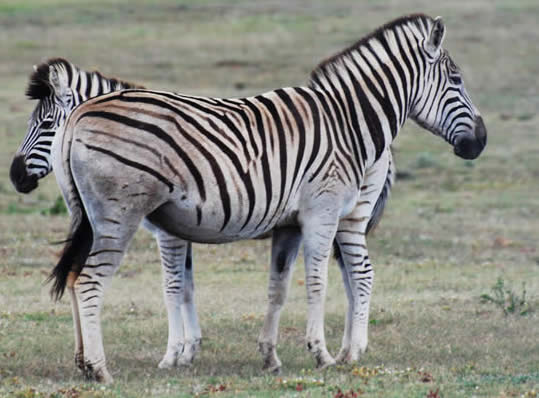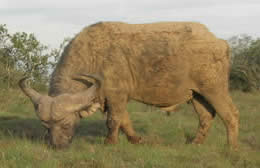Destinations
2026
2027

... where there are many holiday photos to enjoy.

The air holidays shown are ATOL Protected by the Civil Aviation Authority. Our ATOL number is ATOL 3253. ATOL Protection extends primarily to customers who book and pay in the United Kingdom. Click on the ATOL logo if you want to know more.
Mammals at Addo Elephant National Park
This is a collection of photos, all except the buffalo by Honeyguider Rob May, taken on our holiday to the South Africa's Garden Route and Addo Elephant National Park in October/November 2009.
There were just too many pictures to put in the holiday report, so we're pleased to feature more here.

The two male lions in Addo were brought in from the Kalahari, the most similar race to
the lions that would once have been here. They have large darks manes that stretch down between their front legs.

Here's a group of females and large cubs in the shade of some scrub.

Kudu was the mammal we saw most of at Addo. Females lack the twisty horns of the male, above. Alpha males have the longest horns, with most twists.

Warthogs, of course. I think they're cute.

Burchell's zebras. Re-introduced to Addo.

You were just thinking - it's called Addo Elephant National Park, so there must be some! And there are, lots, and increasing steadily.

We saw several young elephants. This one's just a few days old.

Only one of our two buses was lucky enough to catch this spotted hyaena in one of the park's several waterholes. It's also behind the jackal below.

We saw most black-backed jackals on two night drives, but a few during the day too.

Yellow mongoose was seen all four days at Addo.

Red hartebeest. Other antelopes we recorded were eland, common duiker, on a night drive, and bushbuck.
Other mammals we saw in Addo: scrub hare, small grey mongoose, striped mouse, porcupine, karoo bush rat, springhare and meercat.

Vervet monkey - also seen by the coast.

Rock hyrax, or rock dassie, this one photographed by the coast.

OK, it's not a mammal, but where there are elephants there is dung.
Flightless dung beetle Circellium bacchus is the species here.
Dung beetles prefer buffalo (above) and elephant dung, we learnt.

‘Dung beetles have right of way' says the South African National Parks’ sign as you leave the Addo camp
and drive into the park.
It continues: ‘Do not drive over dung beetles or elephant dung’, to emphase the
importance of the beetles’ role in the park’s ecosystem.

Our dates at Addo: we arrived on the evening of 5 November 2009, had four full days 6-9 November, leaving on 10 November.
















